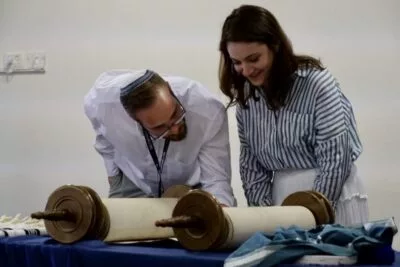Converts Make Great Jewish Leaders, So Let’s Treat Them That Way

The first time I ever made a shiva call, I was nervous. As someone who had only joined the Jewish people four years prior in May of 2015, and whose immediate family included no Jews, there were many Jewish traditions with which I had no personal experience. While I had a familiarity with customs surrounding mourning in Judaism and had been a part of a chevra kadisha for the past two years, experiencing a shiva was different from simply reading about the tradition.
During the maariv, or evening service, I noticed that someone was looking at me. They seemed to be taking note of my movements during the Amidah prayer. Upon the conclusion of the service, they approached me and asked, “I know you must be Jewish because you know the movements to the prayers, but you don’t look like it. Where are you from?”
Moments like this one occur time and again. While my studies have given me the knowledge base I need to participate in Jewish communal and religious life, incidents persist in which I have felt like I continue to stand out too much within Jewish spaces due to my physical appearance. Yet, as surprising as this may sound to others – and even to me, my biggest doubter – converts can not only be dedicated Jews, but can also serve as resources for others to help develop their Jewish identities.
Many Jewish young adults are similarly growing up in environments influenced by multiple traditions. Through my work as a Springboard Fellow at Hillel at Ithaca College, I regularly encounter students who are seeking solutions to scenarios such as how to balance both Christmas and Hanukkah as beloved family celebrations. Students who are asking questions such as, how does Judaism differ from other faith traditions, and in what ways is Judaism similar?
Through these conversations, I discovered that my background was not the liability I thought it might be. Rather, as converts to Judaism, we are in a unique place to help navigate these questions as individuals who are both dedicated Jews and informed about various other traditions in which we grew up. Additionally, because the conversion process in Judaism is learning intensive, I have a deep well of knowledge that mirrors students who, say, grew up going to camp and Hebrew school.
In fact, as a convert serving in a Jewish engagement role, you will find that others who may lack experiences such as Hebrew school, summer camp, or synagogue memberships will be more comfortable approaching you to share about their Jewish identity. Students will speak openly about what it is like to navigate an interfaith family or to begin their own exploration of Jewish tradition as an adult for the first time.
These types of stories are no longer the exception within American Jewish life. Our Jewish leaders ought to reflect this reality among themselves, and our educational spaces ought to foster and lean into this beautiful diversity of experiences in our community.
Of course, there have been times when I felt shaken in this work. There are going to be hiccups because we are not yet, as a community, in a place where converts are wholly accepted, trusted, and unquestioned.
Recently, for example, I met a parent of a prospective Ithaca College student who asked, “What is someone with the last name Reid doing at Hillel?” In the aftermath of such occurrences, you may find yourself struggling against imposter syndrome and confronting the thought that you may not be the right fit for Jewish professional life.
This is why as individuals who have embraced Judaism, we must continue to open our hearts in the service of our community. We need to have the courage to keep reaching out, offering of ourselves, and extending our talents in the service of our community.
I was inspired and aided by those who joined the Jewish community later in their lives when I began my role as a Jewish professional. One such figure is none other than Moses himself, who tradition teaches was raised in a non-Jewish household and only later as an adult reconnected with his ancestral community. Moses also struggled with doubt, as evidenced by his declaration at the burning bush that he lacked the eloquence to persuade Pharaoh, and he was married to a non-Jewish woman, Zipporah. Despite his upbringing and uncertainty, Moses is now considered the greatest Jewish leader of all time.
So, too, in smaller ways, converts are contributing to our contemporary Jewish community. These contributions are invaluable. As more converts take up leadership positions within the Jewish community our presence will become increasingly normalized; our community needs us.
Together let us strive to build a Jewish community that is thriving and welcoming.